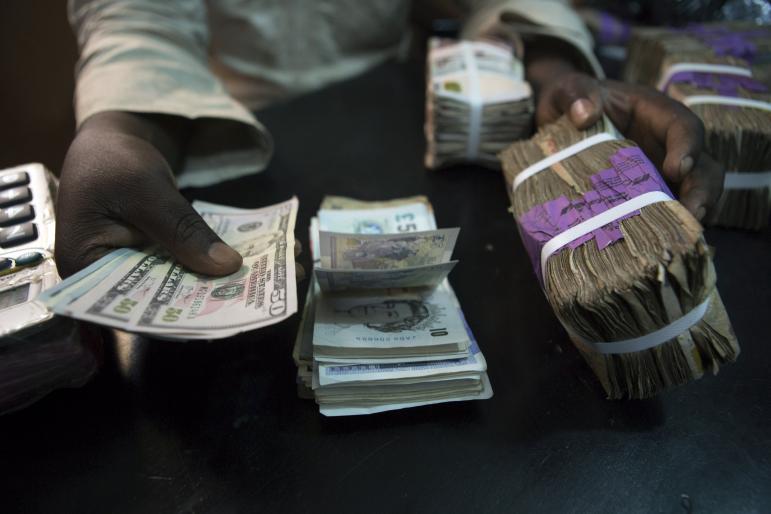The Lagos Chamber of Commerce and Industry said private operators have lost about N1.46tn as a result of the foreign exchange constraints being experienced in the country over the last six months.
This is coming just as the Federal Inland Revenue Service has hinted the citizens will pay higher taxes from next year as a means of shoring up the nation’s revenue.
The LCCI, in its 2015 economic review, said its third quarter 2015 business environment survey showed that a forex restriction by the Central Bank of Nigeria was one of the costliest policies in Nigeria in recent years.
The Director-General, LCCI, Mr. Muda Yusuf, in a statement on Sunday, said, “The private operators across several sectors (fast-moving consumer goods, steel, furniture, pharmaceuticals and manufacturing) lost about N1.46tn in stalled business activities resulting from paucity of forex over the last six months.”
Citing data from the National Bureau of Statistics, he noted that the country’s real Gross Domestic Product fell to 2.84 per cent in the third quarter of 2015, compared to 6.23 per cent in the same period in 2014.
Sectors such as manufacturing and the services slipped into recession after recording successive declines over the last three quarters in 2015, the LCCI said.
The group noted that the CBN had, in response to dwindling receipts from oil export, adopted several measures such as the closure of Retail Dutch Auction System window, restriction of cash payment into domiciliary accounts and prohibition of 41 items from accessing the interbank foreign exchange market.
It expressed concern about the state of the economy and the effects of the CBN’s policies on the operations of manufacturing firms and other private businesses.
It said, “The CBN’s administrative allocation of foreign exchange signposted much deeper challenges for investors and the economy. As of December 18, 2015, premium at the parallel market reached a record level of 35 per cent against the official exchange rate as the naira crashed further to 270/$ in the parallel market.
“The LCCI and the business community are very concerned about the current state of the economy and the consequences of the CBN’s approach to the management of foreign exchange market over the last few months. We have previously engaged the CBN and other authorities through several forums to draw attention to the implications of forex policies on businesses and the economy.”
In its macroeconomic outlook for 2016, the LCCI said it expected the GDP growth to rebound slowly to about 3.5 per cent, which would be driven by the increase in government expenditure.
The group also stressed “the right mix of fiscal and monetary policies to stimulate the economy and attract domestic and foreign investments.”
It also expected the exchange rate volatility to persist, fuelling high inflation of about 10-11 per cent.
“However, correction towards real effective exchange rate in the form of exchange rate adjustment is likely in Q1 2016. This will reduce the pressure on external reserves,” it stated.
The LCCI said with the declining trend of global oil price and its attendant impact on government revenue and foreign reserves, general business outlook would remain tense.
It said, “Implications on cost of and access to credit will be undesirable. Businesses, especially those with high forex exposure, will continue to face challenges of meeting foreign obligations to suppliers and partners. This will also impact contractual trust and integrity.
“Risk of default in financial obligations in both public and private sectors will be high as macro-economic conditions and cash flow remain tight.”
The group noted that the CBN through its Monetary Policy Committee on November 24, 2015 resolved to reduce the monetary policy rate from 13 per cent to 11 per cent (the lowest since 2009) and the cash requirement ratio from 25 per cent to 20 per cent, in a bid to stimulate the economy.
The LCCI said the cost and access to fund remained a major challenge for businesses, especially Micro, Small and Medium Enterprises, adding that through the year, lending rate of commercial banks, including fees and charges, ranged between 22 per cent and 34 per cent, depending on the customer profile, tenor and collateral quality.
Meanwhile, the FIRS has urged Nigerians and others doing business in the country to be prepared to pay higher taxes next year.
The service spoke in Ibadan through one of its accountants, Anuoluwapo Ijaduola, at a lecture on the dwindling crude oil prices and its effect on taxation organised by Excel Assembly Foundation as part of its annual general meeting.
He said, “We’ve all been talking about diversifying our economy; yes, it is good, but it is not the only way out. It will not happen overnight. Corporate organisations, other companies and individuals should be ready to pay more in terms of taxes. If we want the country to move forward, we must be ready to pay our taxes, even more than what we have been doing before. Borrowing money can only be a short-term remedy.”
Punchng

 Billionaire Watch3 weeks ago
Billionaire Watch3 weeks ago
 Startups4 weeks ago
Startups4 weeks ago
 News4 weeks ago
News4 weeks ago
 News4 weeks ago
News4 weeks ago
 Bitcoin4 weeks ago
Bitcoin4 weeks ago
 Naira4 weeks ago
Naira4 weeks ago
 Forex3 weeks ago
Forex3 weeks ago
 Treasury Bills4 weeks ago
Treasury Bills4 weeks ago
























